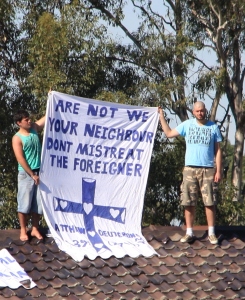Sri Lankan Refugees Sent Back from Australia
 The discussion over the rights of immigrants and refugees demonstrates an important issue facing many countries across the world. The debate heated up again as Australia recently reached a deal with Cambodia to resettle its refugees there while a report from Sri Lanka highlighted how refugees sent back there had been tortured and killed.
The discussion over the rights of immigrants and refugees demonstrates an important issue facing many countries across the world. The debate heated up again as Australia recently reached a deal with Cambodia to resettle its refugees there while a report from Sri Lanka highlighted how refugees sent back there had been tortured and killed.
Australia has been continuously plagued by the influx of refugees from Asia. These refugees board shoddy boats and risk their lives to come to Australia. Many times boats have sunk, killing all those on board. Tony Abbot, the conservative Prime Minister of Australia, came into power with the promise to end the influx of these so-called “boat people”.
Mr. Abbot recently signed an agreement with Cambodia to resettle its unwanted refugees there. The refugees would be transferred to a transit station on Nauru, a microscopic Pacific island, before being sent to their final destination in Cambodia. In return for receiving its refugees, Australia has promised to increase its foreign aid to Cambodia. Mr. Abbot has also moved to introduce temporary visas to help its backlog of asylum seekers. The legislation would allow refugees to work in Australia for a period of five years provided they work in an area that has a shortage of laborers.
However, these proposals have been heavily criticized by human rights organizations as well as by Mr. Abbot’s opposition party, the Labour Party. Many of these human rights organizations believe that Mr. Abbot’s policies violate international laws as they believe it is unlawful for Australia to transfer refugees. The Labour Party, on the other hand, has criticized the Prime Minister for putting refugees in limbo, uncertain of their status and future. But, Mr. Abbot won the election on a platform for curtailing these refugees and he continues to have strong domestic support for his anti-immigration policies.
The Sydney Morning Herald also has reported that the asylum-seeking migrants from Sri Lanka that the Australian government has turned away since June were tortured and raped in their homeland. Interviews conducted with victims reveal that Sri Lankan officials apparently beat and sexually abused them. The Australian government claims that they are unable to verify these claims, as the interviews were conducted both ambiguously and anonymously. The Sri Lankan High Commissioner to Australia issued a condemnation of this report, saying that it was “an orchestrated biased documentary which is absolutely baseless."
It is understandable why countries do not want to receive refugees, since they require costly social welfare programs and will initially provide nothing back to the state. Many Australians are also afraid that too much immigration will overrun their countries’ social services. Furthermore, many people view it is unfair that these refugees can essentially “jump” the line and hop over many people seeking legal immigration. But at the same time, denying refugees is essentially violating one of the fundamental principles that Australia was founded upon.
The refugee situation in Australia illustrates the complex legal and moral dilemmas that governments face when they receive an influx of refugees. These recent news articles in Australia come out amid increasing restrictions against migrants all around the world, especially in Europe and North America. The Abbott administration in Australia has stepped up efforts to curb migrants from crossing its borders and has begun a campaign titled Operation Sovereign Borders in order to remove asylum seekers. This reflects several global trends in the developed countries that migrants attempt to reach. The first is a security concern, especially with the alarming rise of foreign fighters in the ranks of ISIS. Governments in the developed world, particularly Australia after receiving a terror threat over the summer, hope to protect their citizens by limiting migrants.
But the deeper trend here is that many of these developed nations are facing slow economic growth and increasing mandate to provide welfare and jobs for its citizens. Thus both governments and nationals are reluctant, to say the least, to allow more immigrants that can add further stress to their welfare systems and availability of jobs. Paradoxically, Australia and many other Western countries founded by immigration now find themselves in the position of denying people who want to enter their countries. Australia has low fertility rates, which means that it needs to rely on immigration in order to avoid population decline. But, it appears now that Australia is willing to sacrifice its long-term population stability to appease the short-term economic squeeze.
